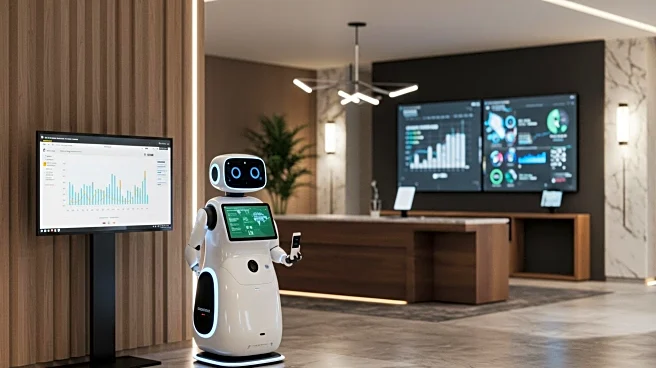What's Happening?
The hospitality industry is experiencing a significant shift in guest engagement and digital marketing strategies due to advancements in AI technologies. Tools such as ChatGPT, Copilot, and Google's Search Generative Experience are changing how travelers plan and book their vacations. These AI-driven tools, known as agentic search, act on behalf of users by synthesizing answers and taking actions like booking rooms and building itineraries. This transformation requires hotel owners and operators to reevaluate their online presence and optimize their content for AI-driven search. Modern hotel chatbots are now capable of performing tasks beyond answering FAQs, such as qualifying leads and handling real-time guest requests. The integration of AI with property management systems (PMS) and customer relationship management (CRM) systems allows for personalized guest experiences.
Why It's Important?
The integration of AI technologies in the hospitality sector is reshaping the guest journey and digital marketing strategies. As more travelers, particularly Gen Z and Millennials, adopt conversational AI for trip planning, hotels must adapt to remain competitive. Failure to optimize content for AI could result in decreased visibility and lost bookings. AI-powered chatbots enhance guest service efficiencies and lead capture, providing a competitive edge. The shift towards AI-driven search and booking processes demands seamless booking paths and mobile responsiveness to ensure conversions. Hotels that embrace these technologies can improve guest relationships and drive revenue by leveraging AI for backend operations, such as forecasting and trend analysis.
What's Next?
Hotels are expected to continue integrating AI technologies to enhance guest experiences and streamline operations. This includes optimizing web content for AI-driven search, deploying advanced chatbots, and ensuring seamless booking processes. As AI tools evolve, hotels will need to regularly audit their digital strategies to maintain competitiveness. The industry may see increased collaboration with tech companies to develop more sophisticated AI solutions tailored to hospitality needs. Additionally, the focus on personalized guest experiences will likely drive innovation in AI applications, further transforming the sector.
Beyond the Headlines
The adoption of AI in hospitality raises ethical considerations regarding data privacy and the balance between technology and human interaction. As AI tools become more prevalent, hotels must ensure they handle guest data responsibly and transparently. The shift towards AI-driven guest engagement also prompts discussions on the cultural impact of reduced human interaction in hospitality services. Long-term, the industry may witness a redefinition of value, where technology complements rather than replaces the human touch in guest experiences.








